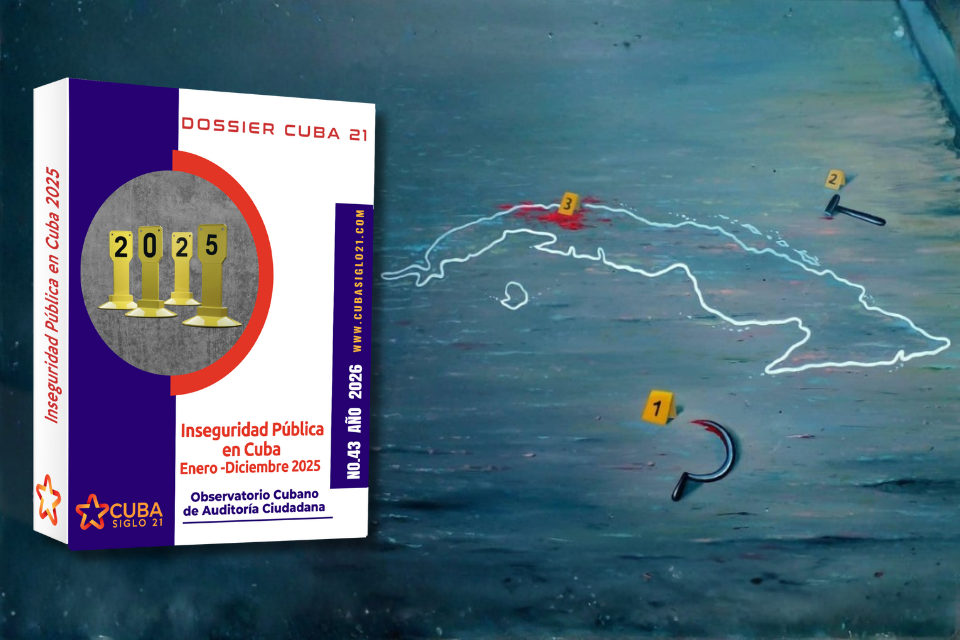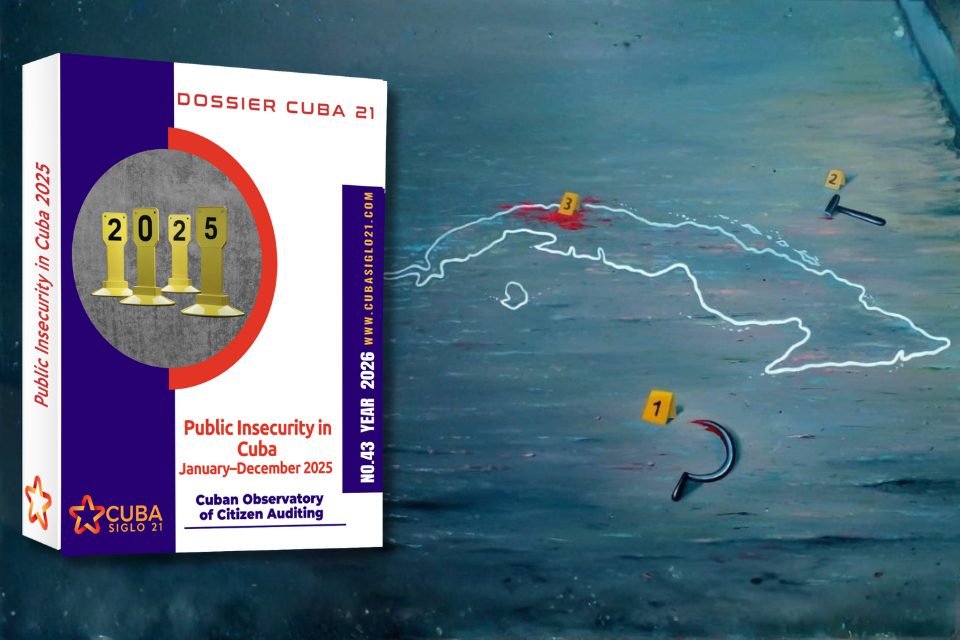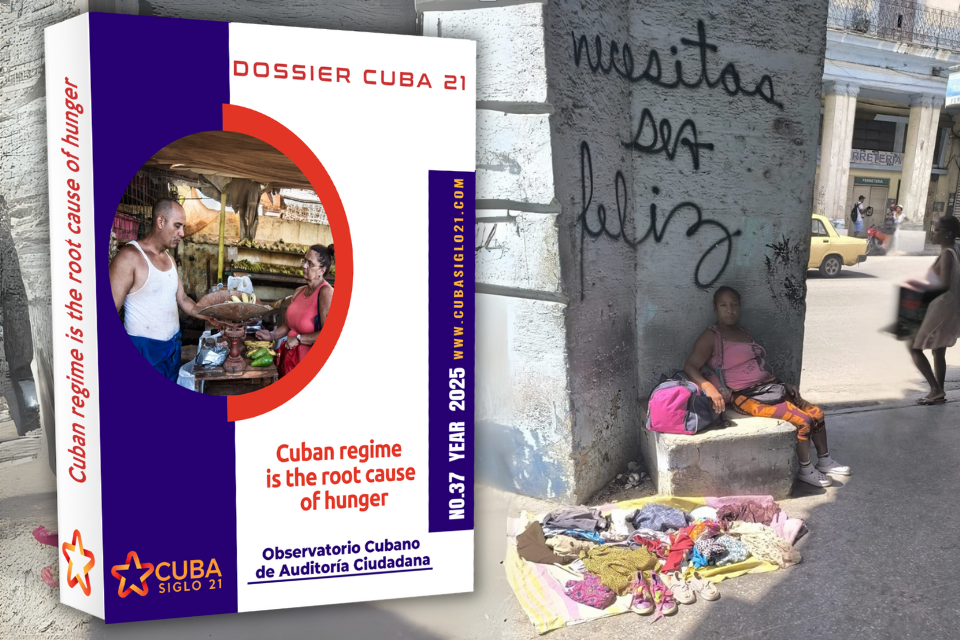La colección Dossier Cuba 21 constituyen publicaciones monotemáticas que han sido escritas a solicitud expresa de Cuba Siglo 21 por especialistas en los múltiples campos y factores que inciden en la evolución actual de la realidad cubana.

Informe de Inseguridad Pública 2025
El estudio del Observatorio Cubano de Auditoría Ciudadana (OCAC) identifica un incremento del 115,11 % de la criminalidad en 2025 respecto a 2024 y un aumento del 336,58 % en comparación con 2023.

El colapso sanitario en Cuba
El gobierno cubano miente acerca de la magnitud del colapso sanitario en Cuba. La cifra de defunciones alcanzaría como mínimo 8,700 fallecidos. so muestra que el estado ha mentido nuevamente (ya lo hizo con la epidemia de Covid) al afirmar que solo han ocurrido 47 defunciones hasta mediados de diciembre. La realidad sería, como mínimo, 185 veces mayor.

GAESA: estado ladrón
GAESA, el verdadero poder en Cuba ha llevado al país a la peor crisis financiera de su historia. Bajo la etiqueta del socialismo, una oligarquía militar controla más del 70% de la economía y el 95% de las finanzas nacionales, mientras el gobierno civil actúa como un simple títere. Miguel Díaz-Canel en la práctica no tiene control de las finanzas del país.

Cuba (1959-2025): la “intervención permanente”
La política intervencionista cubana no es cosa del pasado. Es una realidad activa en el presente a pesar del desastre social y económico de colosal magnitud que atraviesa Cuba en este momento.

EL ESTADO MAFIOSO CUBANO Y EL CARTEL DE LOS SOLES
El Estado cubano se ha convertido en un actor mafioso que opera en el corazón de una red criminal transnacional. El Cartel de los Soles nació y creció bajo esa asesoría cubana. El aporte de Cuba al crimen organizado regional ha sido su asesoría estratégica, militar e ideológica en la creación y consolidación del Cartel de los Soles, organización narcotraficante surgida en Venezuela

Criminalidad en Cuba: escalada sin precedentes y diversificación delictiva
El Observatorio Cubano de Auditoría Ciudadana (OCAC) documentó 1,319 delitos verificados entre enero y junio de 2025, casi cinco veces más que en igual periodo en 2023 y más que en todo 2024. Esto significa un promedio de 7,3 delitos diarios, evidenciando una escalada delictiva sin precedentes y una diversificación de tipologías criminales. Los datos desmienten declaraciones oficiales.

Sin campo no hay país y con GAESA no hay futuro
Para alimentar con lo básico a un cubano se necesitan al menos 30,000 pesos al mes. Esto explica por qué la mayoría de los cubanos apenas logra consumir dos comidas al día y, en muchos casos, ni siquiera pueden incluir proteínas en su dieta.

“¡Transparencia!”: los estudiantes cubanos contra el estado mafioso
¿Quién controla realmente ETECSA? ¿Dónde están sus ingresos multimillonarios? ¿Por qué no rinde cuentas ni al Estado ni al pueblo? Estas preguntas no se limitan a una empresa, sino que apuntan directamente al aparato empresarial que la controla: GAESA, el conglomerado bajo control militar que maneja el 70% de la economía y el 95% de las finanzas en divisas del país.

CUBA: FAMILIAS PRESAS DE LA POLÍTICA TOTALITARIA
El 11J no solo fue un evento coyuntural, sino el detonante de un movimiento social que ha forzado a las familias a cruzar el umbral entre la vida privada y el activismo público. Esto ha puesto al descubierto las estrategias de control social implementadas por el régimen y el uso sistemático del aparato judicial como herramienta de castigo político

Capítulo II de la Ley Helms-Burton: Una Hoja de Ruta para el Cambio
Las demandas que establece la Helms-Burton para la normalización bilateral de relaciones coinciden con las de una ciudadanía que ya no responde a viejos dogmas. Libertad de expresión, liberación de presos políticos, economía de libre mercado y llamado a elecciones libres son hoy exigencias también ancladas nacionalmente que son ampliamente compartidas por una sociedad cansada de promesas incumplidas.

Public Insecurity in Cuba 2025
The study by the Cuban Observatory of Citizen Auditing (OCAC) identifies a 115.11% increase in criminal activity in 2025 compared to 2024, and a 336.58% increase compared to 2023

The collapse of Cuba’s healthcare system
The Cuban government is lying about the extent of the healthcare collapse in Cuba. The death toll would reach at least 8,700 fatalities. This shows that the state has lied again (as it did with the Covid epidemic) by claiming that only 47 deaths had occurred by mid-December. The reality is, at a minimum, 185 times greater.

GAESA: Kleptocratic State
GAESA—the real power in Cuba—has driven the country into the worst financial crisis in its history. Behind the façade of socialism, a military oligarchy controls more than 70% of the economy and 95% of the nation’s financial system, while the civilian government operates as little more than a puppet. Miguel Díaz-Canel has no control over the country’s finances.

Cuba’s (1959-2025) permanent intervention
Cuba’s interventionist policy is not a thing of the past. It is an active reality in the present, despite the colossal social and economic disaster that Cuba is currently experiencing.

THE CUBAN MAFIA STATE AND THE CARTEL OF THE SUNS
The Cuban state has become a mafia-like actor operating at the heart of a transnational criminal network. The Cartel de los Soles was born and grew under this Cuban guidance. Cuba’s contribution to regional organized crime has been its strategic, military, and ideological advice in the creation and consolidation of the Cartel of the Suns, a drug trafficking organization that emerged in Venezuela.

Crime in Cuba: unprecedented escalation and diversification of crime
The Cuban Observatory of Citizen Auditing (OCAC) documented 1,319 verified crimes between January and June 2025, almost five times more than in the same period in 2023 and more than all that happened throughout 2024. This represents an average of 7.3 crimes per day, evidencing an unprecedented escalation in crime and a diversification of criminal types.

Cuban Regime is the Root Cause of Hunger
To feed a Cuban with the basics, at least 30,000 pesos per month are needed. This explains why most Cubans can barely manage two meals a day and, in many cases, cannot even include protein in their diet. One Cuban Pesos equals 0.04 cents of US Dollars.

“Transparency”: Cuban students against the mafia state
Who really controls ETECSA? Where are its multi-million dollar revenues? Why is it not accountable either to the State or to the people? These questions are not limited to one company but point directly to the business apparatus that controls it: GAESA, the military-controlled conglomerate that manages 70% of the economy and 95% of the country’s foreign currency finances.

CUBA: families victims of totalitarian politics
The 11J was not only a conjunctural event, but the detonator of a social movement that forced families to cross the threshold between private life and public activism. Their struggle has highlighted the systematic use of the judicial apparatus as a tool for political punishment and has exposed the social control strategies implemented by the regime.

Title II of the Helms-Burton Act: A Road Map for Change
Cuba has before it the opportunity to break out of its oppression and stagnation. There is no need for another “deal” fabricated by the power elite to maintain its control over the country and Cuban society. The road map the Act outlines in its Title II contains basic demands for freedoms and democracy that are popular in Cuba today. All that remains to be done is to follow it.



